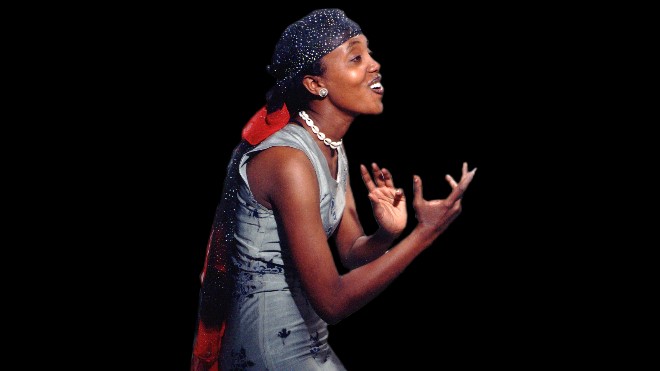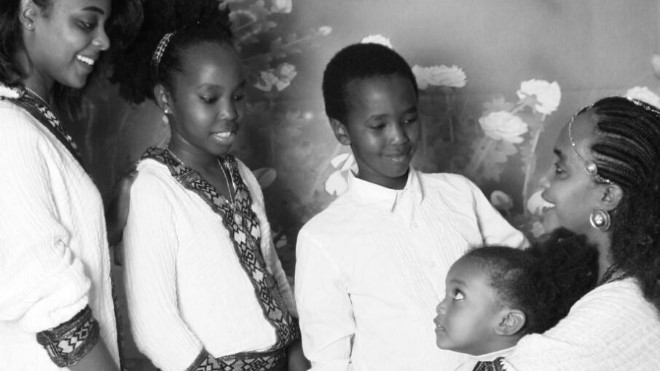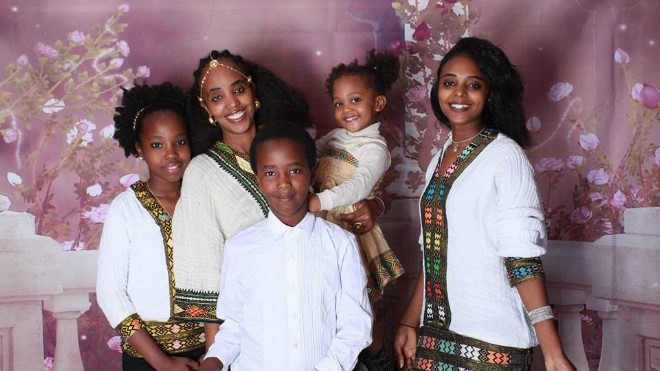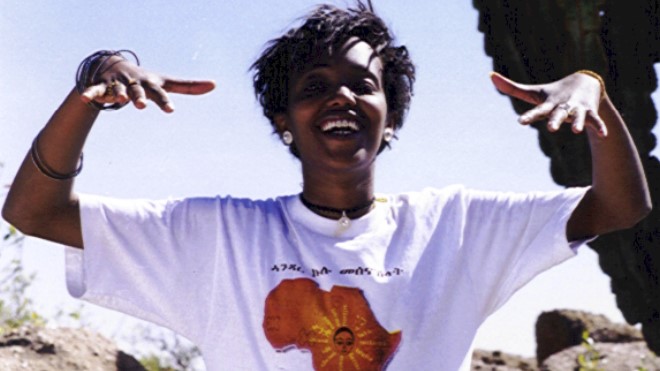Eritrea’s Saba Kidane: Write Saba Write!

Saba Kidane, a poet, performer and journalist, not only can she write heart-wrenching poems but she can also sketch a story through her recital with exuberant confidence and passion. She is a suave, cool and cultured woman.


This quick-witted poet, now based in Paris, is a powerful chronicler of the misery of urban life who ‘sees children growing older, boys and girls flirting and poor women begging in Asmara’s streets as autonomous poetic subjects’. (Charles Cantalupo)
An old NY Times article described Saba’s performance as follows:
The performance is in her native Tigrinya, laced with glottal stops and flattened vowels. Even those who don't know the language are drawn in; by the rise of her voice and the sway of her hips as the words dance from her mouth. But for those who understand her words, the effect is even more entrancing.
''She speaks about the condition of women in Eritrea, particularly women who are survivors of the war with Ethiopia,'' said Prof. Ngugi wa Thiong'o, a world-renowned Kenyan writer. He first saw Ms. Saba Kidane perform in 2000 at a pan-African literature conference in Eritrea. He doesn't speak Tigrinya, but he saw the effect she had on the audience. ''There's humourr there. I saw some women laughing. But I also saw some women crying.''
The Old Neighbourhood
Saba readily acknowledges the influence that her upbringing and old neighbourhood had on her life and work. When asked about where she comes from, she said:
“I was born in the heart of Asmara during the Dergue era. I grew up in a neighbourhood that leaned on Abashawul, facing Edaga Hamus. Godena Ra'esi BeraKi BeKit, as it was called then, is what comes to mind when I think of my old neighbourhood. Basically, I was born in house# 62 and raised in house# 26.”
Saba is such a good story teller she mesmerizes her listeners as she flirts with her lexis. When her mind drifts back to her childhood days, one can see how she conquers the streets of her rough neighbourhood as she drags her audience right behind her. In other words, her recollections are so vivid she can literally take one by the hand and lead him through the crowded streets of her old locality.
Saba can talk for hours about the time she spent at her aunt’s and uncle’s places as a child when her mother went to work. She recalls playing around bar t’Um zeben, the centre of activities in her neighbourhood, visiting her first school at enda’boy-qeshi (enda Selassie) where she learned how to recite prayers in Ge’ez, running errands for her mother to the small kiosks and street vendors … stories that have forever remained engraved in her memory.
Most of all, Saba remembers her visits to adey Ribqa’s place - a prominent and rich woman who lived in house # 114. ‘In fact, adey Ribqa’s place was my first library’, says Saba. That was a place where she could find discarded old newspaper clippings which she read thoroughly and obsessively.
One person in particular captivates Saba’s imagination - her beloved mother who passed away a few years ago. One can say that her mother still dwells in her deepest memories, and probably is the source of her most intimate poems. She remembers her prayers well, and she believes they have always accompanied her.
Saba can describe, in her unique ways, how her mother used to sit in front of the Qonanit during the hair-braiding custom conducted at home. She can also weave a wonderful story around such special occasions – how she used to apply Henna or Illam on her mother’s hands and feet – colouring tints that leave durable stain on the outer layer of the skin.
Where does Saba’s love of writing poetry come from?
‘My poems come from ordinary experiences and objects, I think’, she said. ‘Many come out of past experiences’, she added. During our conversation she casually mentioned the very first book she read - ‘Beauty and the Beast’ in Amharic, a story that left a lasting impression on her. She remembers newspaper stories and photographs, the neighbourhood fights that kept her constantly on her toes, the leaky roof of her small dwelling, the time she attended secondary school with her baby straddling her waist, her Beha’i faith that still keeps her honest to herself, Memhr Tekle Tekeste, one of her favourite poets who, sadly, committed suicide 16 years ago … all touching her heart and soul with a dash of love.
Saba’s work, for the first time, was digitally published by Asmarino.com in 2001. That was during the time when Eritrea was experimenting with free press. She was highly regarded then for her realistic depictions of family life in post-independence Eritrea. And many remember her command of the formal and colloquial aspects of Asmarino parlance, so to speak.

A star was born following in the footsteps of the late Dr Reesom Haile, Eritrea's first internationally known poet. But then she disappeared from the poetry scene all of a sudden. Perhaps she had become the victim of her own success. Apparently, the regime could not tolerate individuals like her who rose to fame without 'government permission' or out of government control.
To explain her sudden disappearance, she said: 'what transpired in the Eritrean political and social landscapes came as a total shock to me'. 'For life to become real life it needs all the natural components in its orbit to revolve around it smoothly', she added. The chaos that erupted then - imprisonment, harassment, bullying and muzzling - put her off her stride. That, in turn, created a vacuum in her. Saba re-echoed the sentiment by saying:
Over the years I became that incomplete Saba as many things in my life fell apart. People went missing one by one and the constellation of artists and writers vanished right from under my nose. You see, to do anything in our culture one needs a group of companions - we do not do things alone. One needs someone to eat with; one feels more comfortable when surrounded by friends and family; one needs a literary companion to work with. That disappeared from my world.
What is unique about Saba is the fact she gets lost in her poetry during recitals. Poetry is her real world now, as far as she is concerned. The eruption of her imagination and poignant poetry, when she shifts her passion, with the energy of desperation, from the child she was, the woman she is onto the world of poetry, dominates her discussions. The chaotic reality of life in Eritrea is always present on her mind.
After going through ‘four rings of fire’, Saba does not condemn the hurdles but continues to celebrate life; she sees her adult life, her current state of mind as another challenge, another way of fighting, another cause.
Asmarino.com wishes Saba good luck. Write more poetry, Saba, write! you can visit Saba's website at https://gazzettasaba.com


![[AIM] Asmarino Independent Media](/images/logo/ailogo.png)